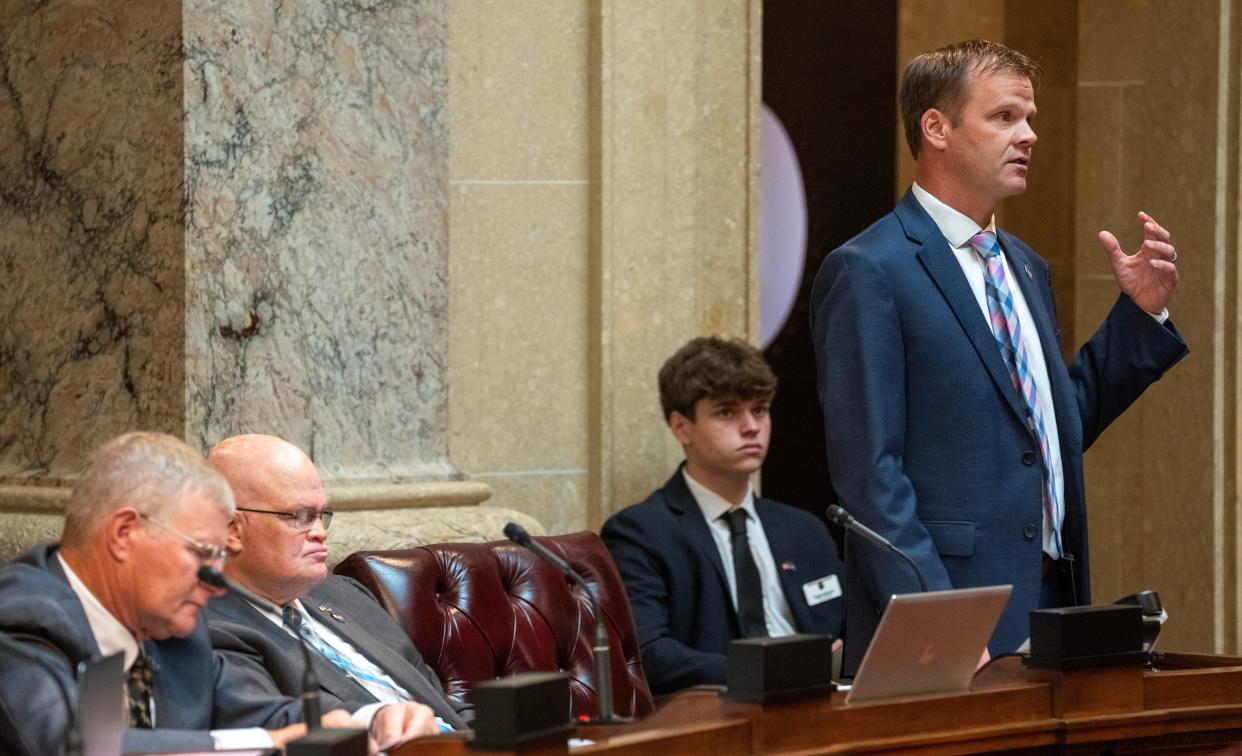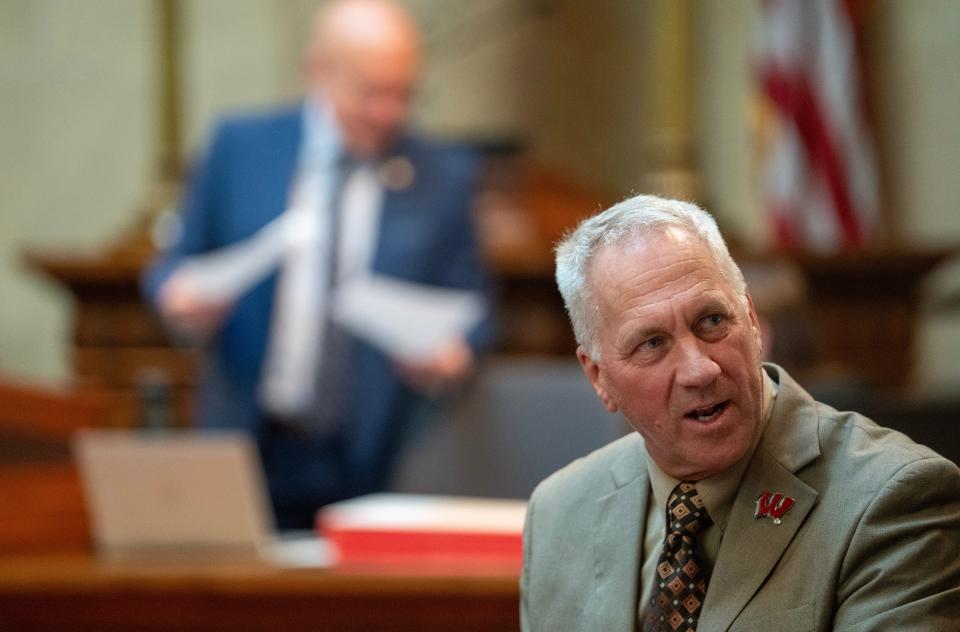Senate leader prepared to let Monday 'ballot dump' measure die despite previous support

MADISON – Senate Majority Leader Devin LeMahieu is signaling he won't seek a vote on a bill that would allow election clerks to start processing absentee ballots the day before Election Day despite once authoring the proposal himself.
By refusing to bring the bill to the floor before lawmakers adjourn for the year, Senate Republicans are leaving open the door to more false claims by former President Donald Trump about the integrity of Wisconsin's elections.
Just after losing re-election in 2020, Trump claimed late-night "ballot dumps" in Milwaukee were to blame for his loss — falsely implying illegal votes were cast.
Election workers, including in Milwaukee, may not count absentee ballots until Election Day. In Milwaukee, that means processing at times more than a hundred thousand ballots while also administering the polls.
The absentee ballots in Milwaukee and several other Wisconsin cities are counted at a central facility and the ballots' results are posted all at once. During large elections, like the presidential in 2020, results are often not ready until late at night.
Trump used this practice to falsely claim the large posting of results was instead a fraudulent "dump" of ballots to doom his reelection.
Clerks and bipartisan lawmakers have pushed lawmakers to allow them to start processing absentee ballots the Monday before Election Day to prevent voter confusion and conspiracies that result from large amounts of ballots being processed late and added to totals, sometimes changing which candidate is in the lead.
Ahead of the 2020 election, LeMahieu and Democratic state Sen. Mark Miller authored a bill that would give clerks the ability to start processing a day early.
"Processing thousands of absentee ballots during breaks or after 8:00 PM can delay election results and create a burden on poll workers and clerks," LeMahieu, a Sheboygan County Republican, said during his testimony to the Senate Elections Committee in January 2020. "Protecting the integrity of our elections is of utmost importance."

Assembly lawmakers earlier this session approved a new bill that would allow the change but it is stalled in the state Senate, where its elections committee chairman, Sen. Dan Knodl, R-Germantown, has refused to advance the bill because of concerns raised by state Rep. Janel Brandtjen, the Legislature's most vocal proponent of baseless conspiracy theories about the 2020 election.
"Monday processing of ballots for efficiency sounds like a reasonable plan. Unfortunately, there are concerns with the chain of custody of ballots and the hearing revealed the disparity of partisan observers of central count processing," Knodl said in a newsletter published in December.
"Considering those concerns, I do not plan to advance the aforementioned bills for an Executive Session committee vote.”
Assembly Speaker Robin Vos said this week he wants Senate leaders to "come to their senses" on the proposal. Vos said the "late-night ballot dump" narrative is one of the top complaints he hears from voters about Wisconsin's elections.
"I have no idea why senators would not want to solve the problem of these late-night ballot dumps," Vos said.
When asked by CBS58 on Thursday whether he would seek to bring the bill to the floor despite Knodl's concerns, LeMahieu wouldn't say and instead implied he couldn't by citing Senate procedures for how a bill can be brought to the floor — rules the Senate can suspend if they desire.
Knodl in a Friday interview on WISN's "Up Front" said LeMahieu and Senate President Chris Kapenga could bring it to the floor if they wanted.
Assembly Majority Leader Tyler August on Tuesday said if the Senate doesn't take up the bill, Milwaukee officials should work to avoid late postings of results.
Milwaukee Election Commission Executive Director Claire Woodall said the time of night when the city reports its absentee ballot results is not an issue of not having enough election workers. Rather, she said, it’s a product of the complexity of processing and counting the sheer number of absentee ballots cast in a city the size of Milwaukee.
That process involves opening tens of thousands of ballots that have been returned in envelopes, assigning each a voter number and putting the ballots through machines that tally the votes — all while continuing to receive absentee ballots throughout election day from voters across 350 wards.
She said other election professionals are amazed at how quickly and accurately the city performs this process. Most states provide for some form of early processing of absentee ballots.
“We do, I think, an excellent job at balancing efficiency and speed with also accuracy,” she told the Journal Sentinel. “So, we will continue to look for ways to make the process more efficient until the Legislature realizes that this is just not a partisan issue in any other state. I’m confident that we’ll continue to do a good job, just like we have been, and we’ll continue to educate the public about if and when results come in later.”
The city has leased the Baird Center to use as its central count location in the November election and Woodall said she expects to hire between 300 and 400 people.
In November 2022, Woodall and members of the city Election Commission arrived at the Milwaukee County Courthouse with absentee ballot results at 11 p.m.
Had the Legislature allowed the processing of absentee ballots to begin the Monday before election day, it would have added to the efficiency and accuracy of the count by avoiding the need to require election workers to work 18 hours straight, she said.
“This could have been a positive improvement to make the process even more accurate and not have people working super long hours where mistakes can happen,” she said. “But, I’m confident that we will continue on no matter what and that we’ll have plenty of staffing and get our results as soon as possible.”
Milwaukee Mayor Cavalier Johnson on Wednesday said it makes sense to process absentee ballots earlier because of the sheer number that are cast in Wisconsin’s largest city.
He said he had been hopeful the legislation would pass this session and raised concerns that the late-night reporting of absentee ballot results would provide fodder for people who incorrectly believe something is amiss in Milwaukee’s elections.
“I hope it does not fuel speculation about whether there's anything going on that shouldn't be in the City of Milwaukee,” he said. “There will not be, there has not been, there won't be.”
Molly Beck and Alison Dirr can be reached at [email protected] and [email protected].
This article originally appeared on Milwaukee Journal Sentinel: Wisconsin bill to ward off 'dumps' of absentee ballots appears dead
